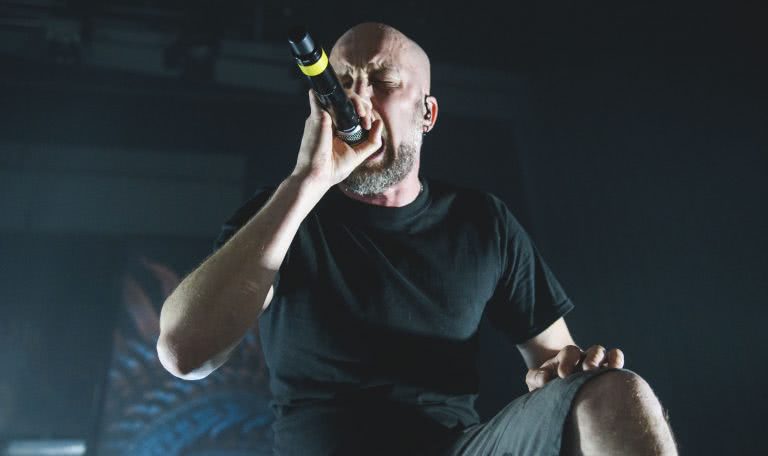Reviewed onSunday March 12 (photo by Ashley Mar)
There are only two kinds of heavy music in the world – Meshuggah, and those cowering in Meshuggah’s blood-soaked wake.
But, as often is the case in this genre, the gods were kind and saw fit to take in Blacktown belligerents Thy Art Is Murder as they ransacked the nation. With the impressively consistent return vocalist CJ McMahon in tow, Murder commanded an impressive crowd – still not enough, though, for McMahon’s liking.
“To those wishing we’d get off stage, because we’re not Meshuggah: go to the bathroom or something, I don’t give a fuck,” he said. The stance was hardly necessary, given the size of the circle pit churning beneath him. Still, the crowd gave a roar of approval as McMahon announced his one-year anniversary of sobriety, and moshed furiously as the stone-faced band thrashed away at its discography.
Murder dropped their more misogynistic lyrics early on in their career, but the attitude has sadly stuck with some of the fan base. On several occasions, women in the mosh were subjected to rough, unwanted attention, and male punters nearby were slow to step in. Only when this grotesque behaviour is purged from the community will metal be universally appreciable – until then, the women diving into these pits are more metal than we can ever aspire to be.
A long wait between sets was rewarded by the crushing chug of ‘Clockworks’, and the storm set in. It is difficult to put words to the perfectly structured live show that Meshuggah have coordinated over their 30 years in the industry. Unlike their supports, they never betray a sense of obligation, of focusing on doing their job – wreathed in darkness, their stillness and composure speak instead to an immovable, masculine aggression that makes them seem evolved to a higher plane.
Vocalist Jens Kidman is the clearest expression of this idea, his silhouetted bear claws and jaw-jutting rising mirrored from the crowd at his feet. Legendary drummer Tomas Haake, on the other hand, is almost invisible, allowing his unfathomable percussive force to emerge organically between machine-gun strobes. For Fredrik Thordendal, the only important thing to see is the speed of his fingers flying. Closed-eye visuals from blinding strobes and surreal patterns forced the viewer into their peculiar zen (aided by ever-present pot smoke).
Meshuggah understand this better than anyone – no individual is key to the band, as they are merely cogs in the perfect machine that the quintet create. On to our measly human ears, and with 30 years’ worth of ammunition, the machine laid down precision fire, and none in the raging pit were left untouched. Chaosphere, Nothing, Obzen, Koloss and the new The Violent Sleep Of Reason were all well-represented, and all pushed aside in the maelstrom of closing track ‘Future Breed Machine’, taking everyone back to the immediacy of Meshuggah’s blast-beating thrash days.
This is a band that never looks down. Meshuggah are the essence of their goals, and we are but instruments of their ungodly machinations. All. Hail. Meshuggah.


































